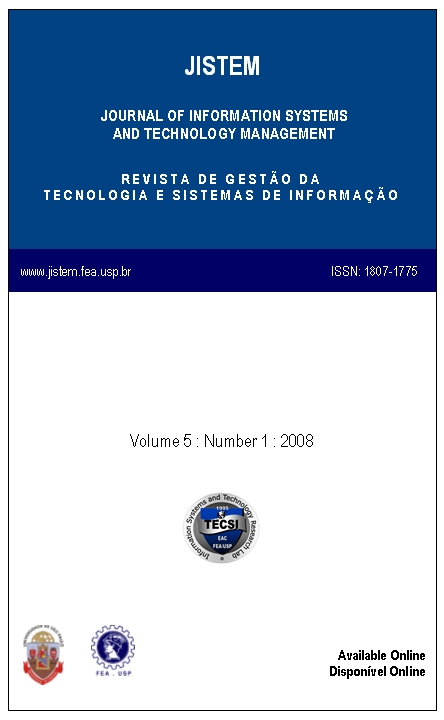Aplicação da abordagem contingencial na caracterização do uso do sistema de controle orçamentário: um estudo multicaso
DOI:
https://doi.org/10.4301/S1807-17752008000100009Palavras-chave:
Sistema de controle orçamentário, Controle de gestão, Teoria da contingênciaResumo
O objetivo deste trabalho foi caracterizar a utilização do sistema orçamentário por meio de um estudo multicaso realizado em duas empresas brasileiras de grande porte. O quadro referencial teórico baseou-se na abordagem contingencial. De acordo com tal quadro referencial, foram estudados cinco itens: tecnologia, participação, acompanhamento orçamentário, integração do sistema orçamentário e ênfase na utilização. Complementados por mais cinco itens que descreveram o contexto corporativo: tamanho, diversificação, descentralização, dinamismo, posição e participação no mercado. Na caracterização do uso do sistema orçamentário, percebeu-se que ambas as empresas utilizavam-no como principal ferramenta de controle gerencial. Não havia participação da média e baixa gerência no processo de planejamento estratégico, sendo que em uma delas, sequer havia divulgação do planejamento estratégico para a média gerência. A empresa A, com uso mais intenso do sistema orçamentário, possuía maior participação dos empregados e buscava utilizar as informações do sistema na implantação de medidas corretivas. Essa empresa era maior, mais diversificada, mais centralizada, atuava num ambiente mais dinâmico, e possuía menor market share. Os resultados obtidos convergiram quase que totalmente com os resultados obtidos em outras pesquisas empíricas e indicaram que as variáveis do contexto corporativo ajudam a explicar a forma como o sistema é utilizado.Downloads
Os dados de download ainda não estão disponíveis.
Referências
Downloads
Publicado
2008-01-01
Edição
Seção
nd1810205790
Como Citar
Aplicação da abordagem contingencial na caracterização do uso do sistema de controle orçamentário: um estudo multicaso . (2008). Journal of Information Systems and Technology Management, 5(1), 163-184. https://doi.org/10.4301/S1807-17752008000100009



